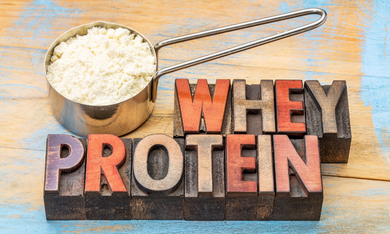1. What Is It?
Whey Protein is a very fast digesting protein that is derived from the protein in cow’s milk and is created as a by-product of cheese production.
Whey is a complex protein made up of smaller protein sub-fractions including beta-lactoglobulin, alpha-lactalbumin, immunoglobulins and some minor peptides all of which have unique biological properties.
Whey protein powder is undoubtedly the most popular supplement in the bodybuilding and fitness industry and is typically sold in three main forms being; whey protein concentrate (WPC), whey protein isolate (WPI) and whey protein Hydrolysate (WPH).
Whey Protein Concentrate (WPC)
Whey protein concentrate is arguably the most popular form of protein powder, by nature WPC contains between 70-80% protein per gram along with higher levels of lactose, fat and biological compounds. On a gram for gram basis WPC contains less protein than whey protein isolate, however it is more in-tact and contains higher levels of growth factors like IGF-1, healthy fats such as conjugated linoleic acid (CLA) and higher levels of immunoglobulins to support immune function.
Whey Protein Isolate (WPI)
Whey protein isolates contain a higher percentage of pure protein typically anywhere from 90%-96% protein and are virtually lactose, carbohydrate and fat free. Two separation methods are used to concentrate and purify whey protein to create WPI, namely ion exchange and micro filtration the second of which is less effective in removing the casein fragment, caseino-glycomacropeptide (cGMP).
Whey Protein Hydrolysate (WPH)
Whey protein hydrolysate is essentially a ‘predigested’ protein that requires another step in the manufacturing process, making it the most expensive of all whey proteins supplements. The human digestive system hydrolyses most proteins before they can be absorbed in the body so by mimicking this process through manufacturing means WPH require less digestion as there is virtually no fat or sugar, unfortunately this also means it has the least appealing flavor and contains very few biological compounds.
2. What Does It Do?
Whey protein is useful for increasing daily protein intake and stimulating muscle protein synthesis (MPS) which can result in a variety of performance and health related benefits, including:
Rapidly Increase Muscle Protein Synthesis
Due to its rapid rate of digestion and amino acid profile, whey protein is able to boost muscle protein synthesis (MPS) quicker than other protein sources. Specifically whey protein is one of the riches sources of Branch Chain Amino Acids (BCAA) namely leucine, isoleucine and valine, the availability of these BCAAs in the hours following intense exercise is especially important for stimulating muscle protein synthesis and increasing muscle growth (hypertrophy).
Reduce Muscle Protein Degradation
Whey protein helps to minimize protein breakdown (proteolysis) and reduce the effects of delayed onset muscle soreness (DOMS). In particular whey protein works to enhance recovery rates from exercise by providing the necessary amino acids that are responsible for maintaining nitrogen balance and a positive net muscle protein balance.
Reduce Body Fat & Improve Body Composition
Supplementing with whey protein can help to increase dietary protein levels above the recommended daily intake which has been shown to help with weight management and fat loss during hypocaloric diets. Compared to Western diets that are typically higher in carbohydrates, studies show whey protein is significantly more effective than carbohydrates at promoting the accumulation of lean muscle mass, reducing appetite and increasing the thermic effect of food, resulting in reduced body fat and increased muscle tissue.
3. When Do I Take It
Whey protein is highly versatile and can be taken at any time of the day when you need a pure, high quality source of protein and calories. Typically most bodybuilding whey protein products will contain between 22-25 grams of protein per 30 gram serving size depending on the quality of the product.
Whey protein spikes leucine and protein synthesis 30-60 minutes after ingestion, therefore to maximize post workout recovery approximately 30-60 grams of whey protein should be consumed immediately following a workout or training session.
Daily protein targets can be achieved through whole food dietary protein alone, the amount of supplemental whey protein in the diet will depend on individual goals, some guideline are as follows.
Bodybuilding/Strength/Fitness athletes losing body fat whilst maintaining muscle mass.
Daily intake of 1.5-3 grams per kilogram of bodyweight.
Bodybuilding/Strength/Fitness athletes maintaining body fat whilst increasing muscle mass.
Daily intake of 1.5-2 grams per kilogram of bodyweight.
General Population/ Sedentary individual attempting to lose body fat.
Daily intake of 1-2 grams per kilogram of bodyweight.
4. How Long Does It Take To Work
Combined with a sensible dieting and training regime tailored to your health and fitness goals, the extra protein and calories that you consume by supplementing with whey protein, will start to take effect within the first 2 weeks of use. You will continue to experience physique changing results indefinitely, provided you stick to your dieting and training regime.
5. How Much Does It Cost?
Protein powder supplements containing whey protein, range anywhere from $1.00 to $3.00 per serve, depending on the size and quality of the product.
Based on an average price of $2.00 per serve, and based on two serves per day, supplementing with protein powder supplements containing whey protein will typically cost around $120 per month.

